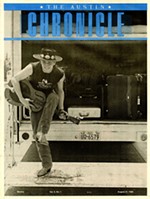The UT Shuttle Shuffle
Cap Metro looks to improve its bottom line
By Lee Nichols, Fri., July 9, 2010

In Capital Metro's ongoing attempts to save badly needed cash, the transit agency is attempting to restructure its contract to operate the University of Texas shuttle bus system. If a Cap Metro staff proposal works as planned, the agency would lower costs for operating the shuttles and possibly bring in a little more revenue. The plan would need approval from both the Cap Metro board of directors and UT. Currently, at least one board member objects to the proposal. The current contract expires Aug. 31.
The plan involves both operational changes and alterations to the way UT reimburses Cap Metro. On the operations end, the agency will radically change the branding of the shuttles – the burnt-orange stripes would be removed (replaced by markings that would still make the shuttles "recognizable from a distance") to make the buses look consistent with the rest of Cap Metro's fleet. This would allow Cap Metro to easily redeploy individual buses to other routes when necessary, something not currently possible for fear of confusing patrons.
Also, although UT bans solicitation on campus (and the shuttles), student organizations and campus departments (such as UT Athletics) are exempt, so Cap Metro wants to introduce a pilot program for selling interior and exterior ads to them.
On the money end, Cap Metro wants to change the way the school and agency divvy up the costs. Currently, UT pays for 65% of "primary costs" (fuel and labor), with Cap Metro footing the rest. The service is funded through student fees. Cap Metro wants to change it so that UT pays 50% of all operating costs, adding in such items as vehicle and building maintenance, marketing and customer service, bus stop maintenance, and more.
Also, UT students currently ride free on other, nonshuttle Cap Metro services. Cap Metro would like UT to start paying a fee of 40 cents per ride in the first year, and 50% of the base fare thereafter. (The contract would be for three years, followed by seven one-year options.)
The new division would not bring in any additional revenue overall, says Cap Metro spokesman Adam Shaivitz – it would stay at about $6 million for a system that currently costs about $12 million to operate – but "the new agreement positions us to transition riders to existing mainline routes where there is capacity on the mainline routes to do so. In doing this," he says, "we can reduce our costs but still get revenue from the ridership on mainline [routes]." This would also be consistent with Cap Metro's long-term goal of phasing out some of the less-used shuttle routes and transitioning those riders to regular routes.
At its June meeting, most board members seemed receptive to the new arrangement, with the exception of Norm Chafetz, who said he had a "philosophical disagreement" with any subsidy for the shuttles and wants UT to foot the entire bill. That appears unlikely. Board Chair Mike Martinez declared from the dais that he intends to vote for the plan, and staff said that if UT decided to cancel the shuttle service altogether, Cap Metro would have to pick up about 80% of the dropped service through regular routes – with Cap Metro footing the whole bill, aside from what little it would get back in fares.
"So it would actually cost us money not to run the service?" asked board member John Cowman.
Chafetz at least got the board to agree to a one-month delay for further study before taking a vote at its July 26 meeting. He said he's been examining similar university-city arrangements and found some that are 100% school-paid. "I'm not convinced we've done enough analysis of this," Chafetz said from the dais. Later, he told the Chronicle, "I just want to be satisfied that we've explored our options."
Got something to say on the subject? Send a letter to the editor.










